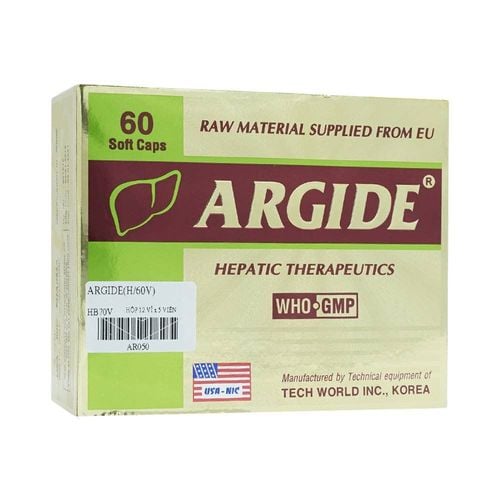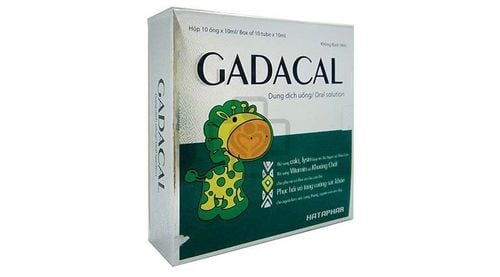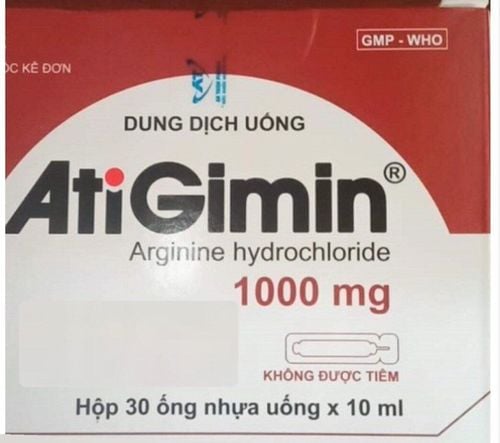This is an automatically translated article.
Aminowel Kabi is manufactured and registered by Fresenius Kabi Bidiphar Joint Stock Company, belonging to the group of gastrointestinal drugs. Refer to the article below to get more information about the use of Aminowel Kabi medicine.
1. What is Aminowel Kabi?
Aminowel Kabi medicine has a capacity of 500ml each, with the main ingredients containing the following active ingredients:
L - arginine HCl 1.35g; L - histidine HCl.H2O 0.65g; L - isoleucine 0.9g, L - leucin 2.05g; L - lysine HCl 3.7g; L - methionine 1.2g; L - phenyllalanin 1.45g; L - threonine 0.9g; L - tryptophan 0.3g; L - valine 1.0g; Glycine 1.7g. The drug is prepared in the form of solution for infusion, presented in bottles of 500ml.
2. Indications of Aminowel Kabi
Aminowel Kabi is indicated for use in the following cases:
Supportive treatment of dyspepsia disorders, liver dysfunction, impaired urea cycle or congenital hyperammonemia. Provides daily energy, electrolytes, amino acids and clear fluid requirements for parenteral nutrition for patients unable to receive oral or enteral nutrition, inadequate or contraindicated feeding, patients with moderately severe catabolism.
3. Usage and dosage of Aminowel Kabi
3.1. How to use Aminowel Kabi Drug Aminowel Kabi is prepared in the form of an infusion solution, administered intravenously, through a central venous catheter, performed by a doctor or qualified medical staff. Patients should not arbitrarily use at home without the supervision of a doctor. 3.2. Dosage of Aminowel Kabi The dose of Aminowel Kabi must be calculated in accordance with the condition and severity of the disease of each individual patient. With a maximum daily dose of 40ml/kg body weight, equivalent to 1.92g amino acids/kg body weight per day. Aminowel Kabi is recommended to be taken continuously. The maximum infusion rate was calculated as 2.0 ml/kg body weight over 1 hour. For patients with renal and hepatic impairment, the dose adjustment must be based on the specific condition of each patient. The maximum daily dose of Aminowel Kabi above 40 ml/kg body weight/day may exceed the maximum daily amino acid dose in pediatric subjects (from 1.5 to 2.5 g/kg body weight/day). ), which should be met with an appropriate volume of fluid replacement in children. In patients with indigestion, liver disorders: Adults take a dose of 3-6g amino acids/day. In children, a dose of 1g amino acid is used, 2-3 times a day. Cases with congenital hyperammonemia: Use dose from 250 - 500mg/kg body weight/day. 3.3. Overdose and overdose handling The use of Aminowel Kabi is done by a doctor or qualified medical staff, so an overdose is unlikely. However, if an overdose occurs, the patient may experience symptoms such as: Electrolyte imbalance, hypertonic water retention, pulmonary edema, fatigue, renal amino acid loss, vomiting, shivering and dehydration. When the patient experiences any of the above-mentioned abnormal signs, the infusion should be stopped immediately. The doctor will conduct supervision to prescribe the appropriate treatment for each individual symptom and the severity of the symptoms.
4. Undesirable effects of the drug Aminowel Kabi
Adverse effects are usually rare during the use of Aminowel Kabi and are usually related to the infusion rate or inappropriate dosing. Side effects are usually only present with no progression and will go away and recover when the drug is stopped. Some undesirable effects can sometimes be encountered such as vomiting and nausea, urge to urinate more often. When parenteral nutrition is administered to debilitated or malnourished patients with the correct dose and rate of infusion from the outset without any appropriate supplementation of Potassium, Phosphorus and Magnesium, it can lead to refeeding syndrome, which is clinically evident by hypomagnesaemia, serum potassium, and phosphate levels. At this time, the undesirable effects on patients are clinical manifestations of refeeding syndrome such as: lethargy and hemolytic anemia, ... It is recommended that patients should notify their doctor immediately if they experience abnormal symptoms to be handled and treated promptly and effectively.
5. Aminowel Kabi . drug interactions
In Aminowel Kabi medicine contains many ingredients, so the interaction of the drug is often quite complicated, it is recommended that the patient list the drugs, functional foods that have been used recently so that the doctor can more appropriate indications in the Aminowel Kabi regimen. The use of tobacco, alcohol, alcoholic beverages or fermentation should be considered while taking Aminowel Kabi, as these agents can alter the ingredients in Aminowel Kabi.
6. Notes when using Aminowel Kabi
6.1. Aminowel Kabi is not contraindicated in the following cases:
The patient has a history of hypersensitivity to any ingredient in Aminowel Kabi. The patient has congenital errors in amino acid metabolism. Patients with liver failure, severe kidney failure and no alternative therapy. Patients with unstable metabolism (eg, metabolic acidosis, decompensated diabetes), coma of unknown cause, pathologically elevated serum electrolytes. Children < 2 years old, infants and young children. In addition, there are general contraindications for parenteral nutrition such as: acute pulmonary edema, fluid retention, decompensated heart failure, hypoxia, and life-threatening circulatory instability. shock, exhaustion).
6.2. Precautions while using Aminowel Kabi Aminowel Kabi should be used with caution in case of increased serum osmolality. It is necessary to correct the disorders of electrolyte and fluid metabolism before appointing Aminowel Kabi. Care should be taken in administering parenteral nutrition to malnourished or exhausted patients to avoid the occurrence of refeeding syndrome. In addition, caution should be exercised when appointing Aminowel Kabi to pregnant women, lactating mothers and children under 15 years of age. Store Aminowel Kabi medicine in a cool, dry place, avoid direct exposure to sunlight or high temperature because these agents can cause changes in the ingredients in Aminowel Kabi. Suitable storage below 30 degrees Celsius.













